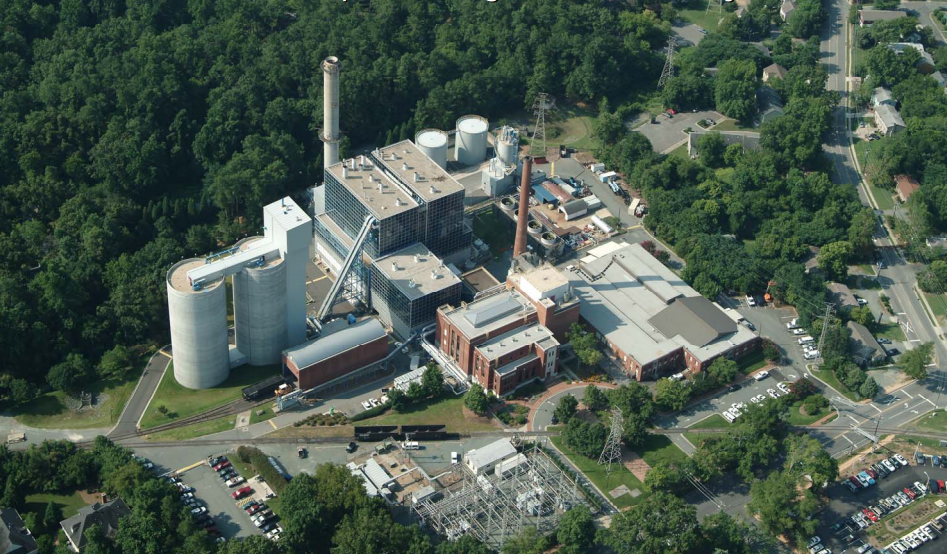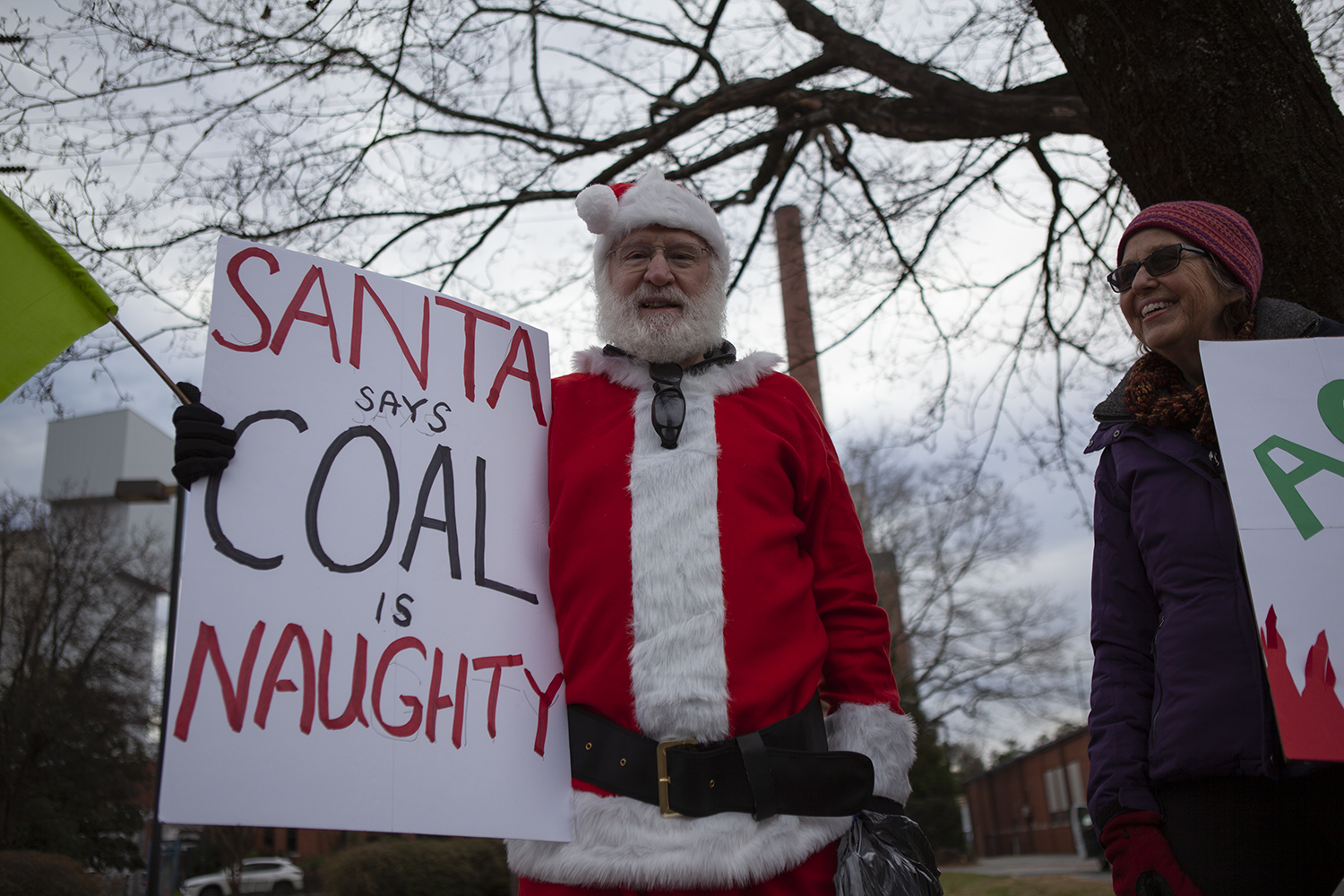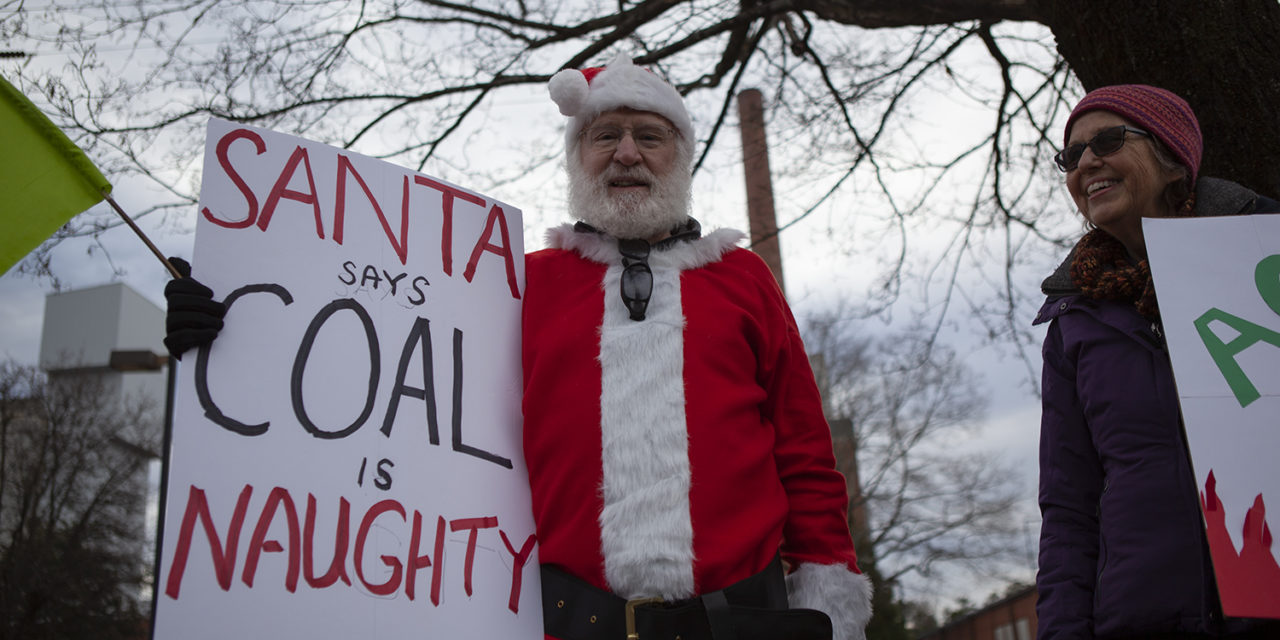Earlier this week, two conservation groups filed a lawsuit against UNC, accusing the university of having violated the Clean Air Act by not following pollution control requirements at a plant used by the school.
But for Gary Richards, this was just the latest step in the battle against the coal plant and the university.
“I’ve been out here since May 17,” Richards said, “because I live a block away from the coal plant and two of my granddaughters go to school a couple of blocks in the other direction at Frank Porter Graham so it’s an immediate thing for me.”
Dressed as Santa Claus and holding a sign that read ‘Santa says coal is naughty,’ Richards joined other members of the community in the weekly protest outside the coal plant on Cameron Avenue.
In the lawsuit, the Center for Biological Diversity and the Sierra Club contend UNC repeatedly violates federal law by not following pollution control requirements at a plant used to power the school. The Center for Biological Diversity says the plant uses two coal-burning boilers that are outdated and significantly contribute to air pollution.
When asked about the news of the lawsuit against UNC, protesters said it was time for the university to find a new form of energy.
“It’s time for the Board of Trustees and the faculty and all students,” said Jay Dunbar, “to make plain that coal is not a viable source of energy and there’s plenty of other options.”
In 2010, former UNC chancellor Holden Thorp said the university aimed to be operating coal-free by 2020, but many reports show the goal was abandoned shortly after because of financial restrictions. Former chancellor Carol Folt — who left the university in early 2019 — pledged during her tenure that UNC would aim to be carbon neutral by 2050.
Diane Nelson remembered UNC’s promise of change, but said legal action might be required for the action to get accomplished.
“The university had promised to shut [the coal plant] down,” she said. “I think they understand as well as anyone — there’s a lot of scientists that work there — about the effects of this kind of thing. If they aren’t willing to shut it down under the promises that they made, then it might take the courts in order to do it.”
Nelson, who lives in the Chapel Hill-Carrboro area, said she’s concerned about the potential impact on children.
“Where the coal plant is specifically terrifying is not only because it’s part of this much larger system that’s destroying the climate, but also because I live in the area where all those particulates are coming into my body. It’s coming into the bodies of the kids who grow up next to me in these expensive neighborhoods where you pay your taxes for the good schools.”
It’s unclear when the lawsuit against the university will be heard in the U.S. District Court in Greensboro.
Related Stories
‹

No More Coal? Chapel Hill Prepares for Hearing on UNC's Co-Gen Plant and Potential New Fuel SourceChapel Hill Town Hall will host a hearing on Thursday to take comments on a potential alternative fuel source for UNC's cogeneration plant.

N. Carolina Doesn’t Pick Electric Mix to Lower Carbon LevelsWritten by GARY D. ROBERTSON North Carolina utility regulators told Duke Energy Corp. on Friday to carry out a series of activities to generate electricity that they say will help ensure greenhouse gas reductions set in a new state law are met. But the Utilities Commission’s order involving solar, wind, nuclear and other sources for electricity doesn’t […]
![]()
Shanghai COVID Outbreak Shows Signs of Waning as Cases FallThe COVID-19 outbreak that has shut down most of Shanghai appears to be waning, with the number of new cases falling below 10,000 a day over the weekend. Authorities have begun a limited easing of a citywide lockdown that has disrupted the lives of millions of residents and dealt at least a temporary blow to […]
![]()
Shanghai Starts China’s Biggest COVID-19 Lockdown in 2 YearsWritten by THE ASSOCIATED PRESS China began its most extensive coronavirus lockdown in two years Monday to conduct mass testing and control a growing outbreak in Shanghai as questions are raised about the economic toll of the nation’s “zero-COVID” strategy. Shanghai, China’s financial capital and largest city with 26 million people, had managed its smaller […]
![]()
Schools Close as Smog-laden India Capital Considers LockdownWritten by SHEIKH SAALIQ and SHONAL GANGULY Schools were closed indefinitely and some coal-based power plants shut down as the smog-shrouded Indian capital and neighboring states invoked harsh measures Wednesday amid considerations of a lockdown in New Delhi to combat worsening air pollution. India’s top court is deliberating on the lockdown — a first of […]
![]()
‘Nothing Else Here’: Why It’s So Hard for World To Quit CoalWritten by ANIRUDDHA GHOSAL Every day, Raju gets on his bicycle and unwillingly pedals the world a tiny bit closer to climate catastrophe. Every day, he straps half a dozen sacks of coal pilfered from mines — up to 200 kilograms, or 440 pounds — to the reinforced metal frame of his bike. Driving mostly […]

Delta Variant Challenges China’s Costly Lockdown StrategyWritten by JOE McDONALD and HUIZHONG WU The delta variant is challenging China’s costly strategy of isolating cities, prompting warnings that Chinese leaders who were confident they could keep the coronavirus out of the country need a less disruptive approach. As the highly contagious variant pushes leaders in the United States, Australia and elsewhere to renew […]
![]()
Choking Air From Western Fires Just Won’t Ease UpRelief from putrid, dangerous air spewing from massive wildfires across the West won’t come until later in the week or beyond, scientists and forecasters say, and the hazy and gunk-filled skies might stick around for even longer. People in Oregon, Washington and parts of California were struggling under acrid yellowish-green smog — the worst, most […]
![]()
Iconic Plant’s End Spells Doom for Struggling Coal IndustryPresident Donald Trump tried to stop it from happening. The top Republican in the Senate, Mitch McConnell, did too. Despite their best efforts to make good on Trump’s campaign promise to save the beleaguered coal industry, including an eleventh-hour pressure campaign, the Tennessee Valley Authority power plant at Paradise burned its last load of coal […]

'Santa Says Coal is Naughty': Protesters Rally Against Coal Plant, UNCEarlier this week, two conservation groups filed a lawsuit against UNC, accusing the university of having violated the Clean Air Act by not following pollution control requirements at a plant used by the school. But for Gary Richards, this was just the latest step in the battle against the coal plant and the university. “I’ve been […]
›






